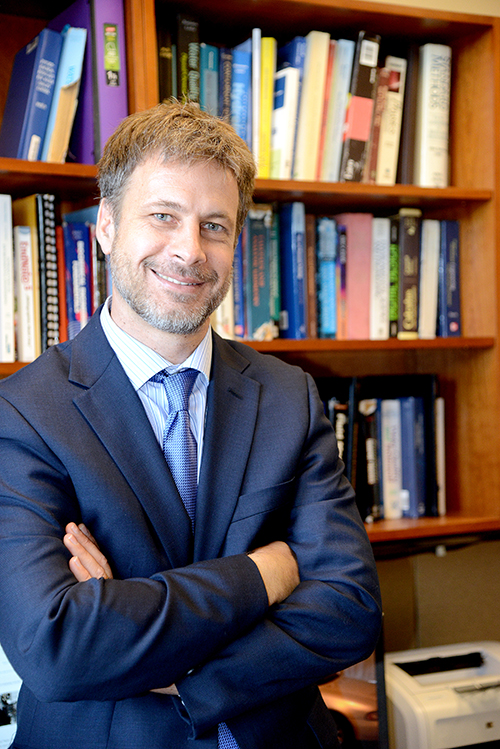Drew Johnson, Ph.D. is a Professor of Civil and Environmental Engineering.
Please tell us about yourself.
I was raised in Minnesota in a suburb of Minneapolis. After high school, my family relocated to Austin, TX where I studied engineering at UT Austin. I returned to Minnesota for my Ph.D. and prior to coming to work at UTSA I was an Associate Professor at the University of Wyoming. I am married and we have four college age kids, which helps with insight for college student life.
What is your job title and what do you do?
I am a Professor of Civil and Environmental Engineering at UTSA. I teach our freshmen Introduction to Civil Engineering course, our senior level Water and Wastewater Treatment course, and graduate courses to our Masters’ and Ph.D. students. I also conduct research with a focus on characterization and control of water pollution. Other things I do include serving on the Faculty Senate, participating in the Urbino study abroad program, and general administrative work to help enhance the student university experience.
What brought you to UTSA?
I came to UTSA because I wanted to be a part of an aspiring university with the potential for growth. I also had a desire to live in central Texas because I have extended family in the area.
What got you into engineering? What is your first memory associated with engineering?
I chose engineering primarily because I was reasonably good at math and physics and was told (correctly) that engineers had good job placement after college. My first experience with engineering was when I worked at the USGS in Austin as a student intern. I was tasked with digitizing paper maps into computer maps so the engineers could do flood forecasting for Leon and Salado Creeks here in San Antonio.
Serendipitous now to be studying and living and working so close to these creeks when at the time I had never been to San Antonio.
What projects are you working on now?
I am working on projects in collaboration with other research groups to assess and protect the Edwards Aquifer from contamination. Contaminants of concern range from sewage to motor vehicle emissions. Field work is required for these projects and things are a little more difficult currently with the necessity of the COVID-19 stay at home orders, but we are making progress.
What do you find most challenging and rewarding about being an engineer?
Engineering is open ended with many possible solutions to explore for a wide variety of problem types. This keeps the work interesting and always evolving which I find both rewarding and challenging. Additionally, engineers have to be able to communicate the how and why of the job to a broad audience. I find this interaction with non-engineers in my community to be rewarding as well.
What did you want to be when you grew up?
I have always been very curious, and I think I wanted to be an inventor. When I was young, I would disassemble items in the home to see how they worked – things like our telephone, typewriters, and pens. At the time I was not very good at reassembly, so we had a lot of non-working items in my home.
How do you like to spend your free time?
I like to run for exercise and I also play games online with friends and family. Much of my job involves sitting at a desk, so I’ve developed a working-with-my-hands type of hobby and do automotive mechanical work for my entire family.


